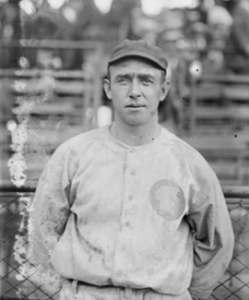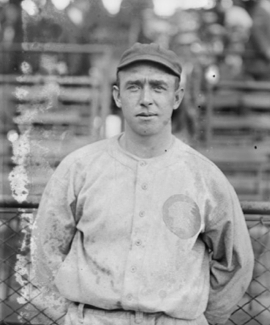September 18, 1915: Braves, trying to keep pace, drub Cardinals 20-1
 Chasing Philadelphia and Brooklyn in search of a repeat of 1914’s miracle finish, the Boston Braves needed to win just about every game through the 1915 season’s end. On this Saturday afternoon, Boston scored a season-high 20 runs against the Cardinals at Robison Field in St. Louis in the first game of a doubleheader. A 6-3 victory in the second game left the Braves a half-game behind Brooklyn and five games in back of the Phillies with 14 to play.
Chasing Philadelphia and Brooklyn in search of a repeat of 1914’s miracle finish, the Boston Braves needed to win just about every game through the 1915 season’s end. On this Saturday afternoon, Boston scored a season-high 20 runs against the Cardinals at Robison Field in St. Louis in the first game of a doubleheader. A 6-3 victory in the second game left the Braves a half-game behind Brooklyn and five games in back of the Phillies with 14 to play.
Indeed, the 1915 season was similar in some ways to the Braves’ pennant-winning surge of the year before. The ’14 team had been as many as 16 games under .500 in June. This 1915 team had fallen 11 games under .500 after a loss on July 13. The doubleheader sweep pushed the Braves’ record to 42-21 since that date. Winning nine of the last 14, however, was not enough, even though the team ultimately finished ahead of Brooklyn.
The Saturday twin bill followed a frustrating day in St. Louis on Friday. The Braves settled for a 2-2 tie with the Cards after falling, 1-0, in the opener of Friday’s doubleheader. The Cardinals run was unearned, thanks to an error by shortstop Rabbit Maranville.
A crowd estimated at 5,000 was on hand on Saturday.1 The Cardinals came in at 68-72 on their way to a sixth-place finish at 72-81 in Rogers Hornsby’s first season in the majors. Hornsby was at shortstop for the Cardinals in both games and went 2-for-8, lifting his average to .182.
In the opener, the Braves started Dick Rudolph, who was trying to become a 20-game winner for the second straight season. He had won 26 games in 1914. Listed at 5-feet-9 and 160 pounds, Rudolph relied on an outstanding curve and excellent control. He also threw a spitball, but “about all you could say for it was that it was wet,” Braves catcher Hank Gowdy recalled.2
Cardinals starter Dan Griner didn’t last long. He plunked Braves leadoff batter Herbie Moran in the back and then walked Johnny Evers. After his first pitch missed to Pete Compton, Griner was lifted by Cardinals player-manager Miller Huggins.3 Right-hander Hub Perdue replaced Griner. Compton bunted the runners over before Sherry Magee flied out, so Perdue had a chance to get out of the inning. Instead, he walked Red Smith to load the bases. The floodgates opened when Joe Connolly tripled off the center-field fence. Maranville singled to right to score Connolly and put Boston up 4-0.4
“The bombardment went on with increased ferocity in the second,” the Boston Herald wrote.5 Gowdy, batting eighth, and pitcher Rudolph opened the inning with singles. Huggins yanked Perdue in favor of lefty Dick Niehaus, who walked Moran and Evers, forcing in a run. Compton’s fly ball brought in another run before Magee drove in two more with a triple to center. Niehaus walked Smith. Magee scored on Connolly’s groundout. Maranville walked. Gowdy doubled to right, bringing in the sixth and seventh runs and knocking out Niehaus. Right-hander Fred Lamlein stopped the bleeding by striking out Rudolph.
Lamlein appeared in four games in 1915, his last in the majors. In three of the four, he yielded no earned runs. On this day, however, he would not escape unscathed. Down 11-0 and with a second game to come, Huggins left the righty in to take a beating.
The Cardinals, obviously, weren’t a happy bunch by the time they batted in the bottom of the third. Rudolph apparently had thrown a number of high-and-tight pitches6 and had quick-pitched several St. Louis batters in the first two innings.7 Rudolph got a strike call when Cardinals left fielder Bob Bescher thought he was being quick-pitched. After Bescher grounded out to end the inning, he approached the mound, exchanged words with the pitcher, then threw a punch. The pitcher ducked out of the way, but his cap was knocked off. Both players ended up on the ground before teammates and several police officers rushed out to keep them apart.8
Bescher and Rudolph were ejected by umpire Hank O’Day. “Bescher beat it, hurriedly [but] Rudolph retired to the bench and stayed there. … The fans chided Rudolph about being afraid to leave the field.”9 Finally, accompanied by three Braves and two policemen who were detailed to provide protection, he left for the clubhouse.
Rookie Jesse Barnes replaced Rudolph on the mound and finished the game, yielding just a meaningless run in the eighth.
Lamlein got through the next three innings, giving up just a run in the fourth on Magee’s triple. Then the Braves offense re-ignited. A single by Magee, who finished with four hits, a double by Smith and a single by Connolly brought in two runs in sixth. In the seventh, singles by Barnes, Moran, Evers, and Magee scored two more. Maranville’s triple and “a few hits and errors and things” led to four more runs in the eighth.10 (Actually, only one error was charged, but the sportswriters by that time seemed to have lost count.) By the end of the frame, Lamlein had surrendered 16 hits and nine runs. Somehow, the Braves did not score in the ninth.
The Braves had pounded out four triples and three doubles among their 22 hits for 33 total bases. Gowdy matched Magee with four hits. Braves pitchers were 3-for-6 at bat. Evers scored four times. “The Braves tongues were hanging out from galloping around the bases,” the Boston Herald wrote.11
Under the scoring rules of the day, although starter Rudolph had pitched just three innings, he was awarded the win.
The 20 runs scored were the most in a game by any National League team in 1915, as were the 20 runs allowed by the Cardinals.
Sources
In addition to the sources cited in the Notes, the author also consulted Baseball-Reference.com and Retrosheet.org.
Notes
1 N.J. Flatley, “Double Win by Braves Arouses Flagging Spirit,” Boston Herald, September 19, 1915: S2.
2 Undated clipping from Rudolph’s player file at the Hall of Fame’s research center, cited in Dick Leyden’s SABR bio.
3 The Boston Globe, Boston Herald, and Boston Post accounts of the game say Griner was relieved before the third batter was retired, but the baseball-reference.com and Retrosheet.org box scores credit Griner with pitching one-third of an inning. Neither has a play-by-play of this game.
4 Flatley: S1.
5 Flatley.
6 “Braves Drub Cards in Two,” Springfield (Massachusetts) Sunday Republican,” September 19, 1915: 4.
7 W.J. O’Connor, “Bescher Lands on Pitcher Rudolph; Cards Lose Twice,” St. Louis Post-Dispatch, September 19, 1915: 1S.
8 J.C. O’Leary, “Braves Win Two in Riot of Runs,” Boston Globe, September 19, 1915: 10.
9 O’Connor.
10 Flatley.
11 Flatley.
Additional Stats
Boston Braves 20
St. Louis Cardinals 1
Robison Field
St. Louis, MO
Box Score + PBP:
Corrections? Additions?
If you can help us improve this game story, contact us.


